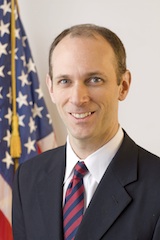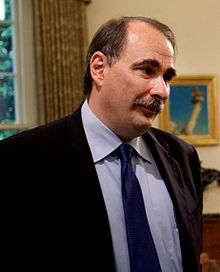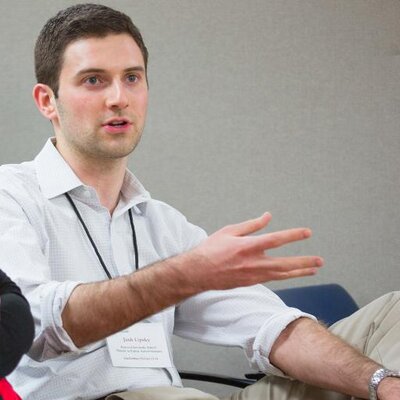All the Way to the Massachusetts Senate, the Path Lesser Traveled By…
UPDATED: For clarity.
This is the first in a series of posts on the new 189th Massachusetts General Court sworn in January 7.
BOSTON—A friend told freshly minted college graduate Josh Lipsky to look out for somebody. Plopped into St. Louis just as the 2008 Democratic presidential primary died down, Lipsky was searching for Eric Lesser, a year-long vet of the junior Illinois senator’s campaign. Lesser was only a name then, but not for long.
“The moment we met, he was so welcoming. Showed me the ropes,” Lipsky said. A friendship that would lend support to both young men through politics and life was born. “I don’t have any brothers, but he always felt like a brother,” Lipsky added.
Below the gold State House dome Wednesday, it was Lesser being welcomed into a new crowd. A former White House aide, Lesser, 29, began his first term as the senator from the 1st Hampden & Hampshire district, as his family and friends beamed with pride.
Those who do not know him may view Lesser’s assent with a jaundiced eye or purely the result of luck. People close to him consider it the result of hard work without any expense of his character or quality.
“He was meant for this,” said Jessica Elin, his campaign treasurer who attended middle and high school with him. She continued, “I wouldn’t have done my job to the extent I did if I didn’t believe in him.”

Lesser, with wife Alison Silber and daughter Rose picking up his nomination papers last Feburary (WMassP&I)
When Lesser told Lipsky about the chance Gale Candaras’ retirement offered, “I just told him I’d be there 100%. I’d be there and I’d have his back.”
Lesser claims he always wanted to be in public service, but, “The exact details were always up in the air.”
Without a doubt, politics have been a dominant part of Lesser’s life from his inescapable “Lesser of two evils” class president slogan to when he swore the oath of office.
Tom Shea, a former columnist for The Republican recalled first hearing of Lesser and marveling at the then-18 year-old’s political accomplishments, including a successful override campaign.
“Maybe it is a regular occurrence, someone winning the class presidency four straight years, but I had never heard about it before,” Shea wrote in an email.
Forty-eight hours before taking office, Lesser discussed his life and career in Tower Square’s food court in downtown Springfield as the growing, but underwhelming lunch rush began. He recognized he was “blessed” with opportunities his parents did not have and few in the withered local economy have today.
Lesser noted the unglamorous beginnings of his parents—a doctor and a therapist—in New York’s tiny apartments and housing projects. For them, the American dream still flowered.
“Now is the time to pay it forward,” Lesser, a graduate of Harvard and a still a law student, said.

Herbie Ziskend (via Twitter/@herbieziskend)
Herbie Ziskend met Lesser, both then-recent college grads, while flying to Iowa for Barack Obama. The two often shared hotel rooms during the 2008 campaign and, along with Lipsky, were roommates in Washington. After the election, they were among the tide of young human masses flowing into DC.
“The country was in turmoil, two wars, there was this huge sea change of people,” Ziskend said, who transformed the city in the process. Reporters, whose sandwiches Ziskend made and luggage (and its contents) Lesser secured, wanted to write about them, “Who are the young people that this new young president is representing?” Reporters befriended many of them, too, even attending their sendoffs such as Lesser’s to law school.
Lesser had attracted the attention of David Axelrod, who hired him as his aide in 2009. Obama’s top economist in 2008, Austan Goolsbee, noticed Lesser too. After working with Axelrod and Lesser on things like the Volcker Rule, Goolsbee snapped Lesser up as Axelrod ended his stint in Obama’s administration.

Austan Goolsbee (via wikipedia)
“Everybody knew he was very talented,” Goolsbee, a member and later chair of the Council of Economic Advisers until late-2011, said.
Goolsbee, an economics professor at the University of Chicago, hired Lesser to help with speechwriting and advancing priorities. “Eric would help me coming up with subjects to do these White House whiteboards,” for which Goolsbee gained some notoriety.
Dressed in a dark suit, blue shirt and crisp red tie, Lesser evoked a contrast with the frolicsome, dancing likeness in a 2010 New York Times Magazine article. Images of youthful fun archived within social media have given way to weddings and babies, but time and politics have not affected Lesser’s core.
“As a friend, I’ve seen zero change,” Ziskend noted. Even as Lesser pulled 18 hour days over the past year, he stayed in contact with him by text and email, which was typical and “actually remarkable.”
Ziskend recalled being stuck in a clichéd New Hampshire primary snowstorm with Lesser, who whipped out his flip phone to offer consolation to losing candidates—running for Harvard Democrats president. “Who not in college would do that? It is because he cares,” Ziskend added.
Likewise, when Lesser’s eligibility to run was in doubt, the candidate moved quickly to reassure his team.
Friends and press accounts do not neglect his neurotic side, which added to his entertaining relationship with Axelrod. It appears in flashes of humor or inflection as the Times piece, written by Ashley Parker (via whom Lesser met his wife), illustrated:
“People are commenting on it,” Ziskend teased Lesser at Café Dupont, referring to his housemate’s new and improved physique.
“Really?” Lesser asked, laughing. He looked up and added, a touch more seriously: “Really? Like who?”
The heady, early days of Obama’s administration are long gone, but Lesser remains sanguine as he enters among the more notorious political shark tanks: Beacon Hill.

David Axelrod–when he had the ‘stache. (via wikipedia)
“You can be optimistic without being Pollyannaish,” Lesser argued, explaining with an air of 2008, that only by engaging the process, whatever its flaws, can change occur. He observed that he was realistic about the scope of the region’s troubles throughout, but insisted business as usual would no longer do.
Despite faith in that earlier era, it is reasonable Lesser appreciates the realpolitik of governing. As Axelrod’s assistant, he would have seen first-hand the compromises Obama, a dovish liberal candidate, made from bailouts amid recession to escalation amid war.
“The process can be get messy. Are those reasons to abandon it? No.” he insisted.
The senate race got messy. Few points in Lesser’s life were a journey through the underworld like the campaign was. One elected official, observing Lesser’s stress, said despite all a candidate does, a powerlessness hovers overhead until the polls close, when nothing more can be done.
“He realized how much you have to rely on your staff and trust them,” Ziskend said.

Josh Lipsky (via twitter/@joshualipsky)
Moments of frustration dimmed, but did not extinguish Lesser’s optimism. Lipsky, while attending the Kennedy School of Government (and whose hats brought a touch of class to standouts), often traveled west to help his buddy out. “Eric reminded us even more than when we reminded him, even when there were stressful moments, others were struggling far more,” Lipsky said.
Lesser sacrificed time with his wife, Alison Silber, and daughter Rose, although they often campaigned as a family. Lesser said Rose can now say “walk,” not to acknowledge another of her abilities, but to express desire to take a stroll with mom and dad—now without a clipboard and list of doors to knock.
He made time for just himself and Silber, too. Shea, the columnist, remembered running into Lesser, both with their wives, at Ume in Longmeadow, “He said it was their date night.”
Lesser, Shea wrote of the encounter, “Says that I was the first person to write about him. Small pause. ‘He wrote I didn’t have a date to the senior prom.’”

The audience at Lesser’s residency hearing in June was mostly his supporters. Josh Lipsky, third left in back row. Jess Elin is second right from back row. (WMassP&I)
Even as he dismissed it as cynical politics, the nature of the fusillade aimed at Lesser had to grate on him. His eligibility was challenged by Democratic primary opponent Tim Allen. The only such challenge in 2014, it played out despite pleas to abort including some from those close to Allen.
As he raised money out of state, opponents zeroed in on that, stoking skepticism and insularity, ironically fortifying a narrative that Lesser was the one to beat.
There were times, Lipsky recalled, when “we just had to give him laughs.” He sometimes invoked a running gag from their White House days wherein someone would whisper, “Don’t blow it!” to a person just about to speak. A reminder (or reenactment) always eased the tension.
There might have been some culture shock with this Ivy League-educated kid coming back home, prompting some claims he was disconnected from the region’s ills. This might surprise friends who once teased Lesser over how often he mentioned home.
Lipsky, discussing Lesser’s decision to run said, “I wasn’t surprised. He talked for years about Longmeadow and Springfield, how much he loved Longmeadow and Springfield.”
Labelled “sweet-natured” and “conscientious” by Beltway reporters, Lesser defaults to a pleasant, sincere mien. At his residency hearing, Lesser plastered onto his face a more restrained smile, even as he cheerily testified, masking his death stare beneath.
Debra Boronski, Lesser’s Republican opponent, dug up Lesser’s Op-Ed in The Harvard Crimson to allege Lesser had admitted to felonious content (satire, people!), which had its day in the local news cycle.
“He’s not naïve,” Ziskend said. “That’s just politics as usual, that was the point all along.”
After being one of the rare Democratic bright spots of 2014, governing begins. Campaign promises face the cold hard reality of tight budgets and political opposition.
Lesser acknowledged success will require “careful, quiet work, compromise, working across the aisle.”

Senator Benjamin Downing (via Facebook/Downing campaign)
“When you go in out of the House, you have a set of relationships,” Pittsfield Senator Benjamin Downing said shortly after he and Lesser were sworn in. Otherwise, “the only real signposts you have is your campaign.”
Like Lesser, Downing, 33, came to the senate without prior elected service. Entering with a clean slate, Downing says, offers opportunities for mentorship and to utilize senior senators experience, “We’re excited to see what he can bring.”
As for policy, Goolsbee said prescriptions like job training can be helpful for places like Springfield, but any policy may be a long term venture with little short term reward.
“What makes them hard is you need to have a sustained commitment,” he continued, “but Eric is more of a sustained commitment kind of guy.”
Wednesday, nearly a year after the deliberation and planning began, the challenges, though still ahead, could wait. Friends, family and supporters basked in the moment.
Proud day. MT @MSzafranski413: @EricLesser formally sworn in as #1sthampsen. pic.twitter.com/MRfXmNjKlB
— Josh Lipsky (@joshualipsky) January 7, 2015
His past titles—class president, advance staff, logistics coordinator, Special Assistant, Director of Strategic Planning, senator-elect—faded behind new and current ones as outgoing governor Deval Patrick administered the oath.
Lesser was senator, alongside son, husband, father and—by blood and not—brother.
“He is excited. I just sense that every time I talked to him,” said Lipsky. “I think he’s going to do great things.”
